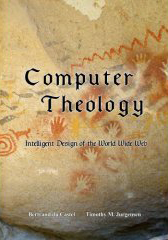PRESS
COMPUTER THEOLOGY |
||||
|
will suggest a bit later that removing any ambiguity in this
assessment, as a point of law, is a necessary ingredient for the evolution of
computer systems in general and personal electronic devices specifically if
they’re to have any chance at all of enabling a strong trust infrastructure on
behalf of the computer owner and bearer. At the seminal point of trust
establishment for extended social systems in general and for widespread
computer networks specifically, a variety of players have now entered the game.
Not least among these are the various governmental entities that have been
charged with establishing identity systems of varying extent and purpose; state
driver license bureaus and the U.S. Department of Commerce are specifically
driving standardization efforts aimed at establishing trusted identity
mechanisms. The impetus for such activities is the increase in attacks on the
benefits derived from social ecosystems; attacks that are enabled by
deficiencies in our computer systems through which the fabric of our society is
extended into cyberspace. Identity theft is proving an ever increasing threat
to our species across the full range of the needs hierarchy. Financial
facilities such as checking accounts or credit card accounts are being
improperly impacted because establishing the true identity of the account
holders requires mechanisms found readily in our personal cognitive
capabilities but lacking in our computer systems. Attempts are being made to
address these deficiencies on a piecemeal basis. An example is the formation of
Internet-oriented industrial groups, perhaps best exemplified by the Liberty
Alliance Project, that are seeking to establish operational standards for
personal identification within the Web. Concerns about the trust ascribed to
software vendors and operators have recently become significant issues in other
areas as well. The Web search engine portal Google.com provides general broker
connectivity between consumers and providers of content based on search engine
value. However, Clive Thompson of the New York Times reported on At the present time, the most general business model of Internet access evokes payment for speed and volume of access to the network proper but not for the specifics of traffic generated or used. The end users that constitute the bulk of consumers of Web services will typically connect to an Internet Service Provider (ISP) through dialup telephone lines, Digital Subscriber Loop (DSL) lines or cable television connections. The transmission speeds provided by these various channel mechanisms range from thousands of bits per second up to millions of bits per second, and volumes reach billions of bits. Web portals and services might use connections which provide yet higher channel speeds and volumes. However, the price of these connection channels is not currently geared to the content generated or consumed. Whether the connected system is continuously blasting bits into the Internet, or whether it is sending vast quantities of bits in spurts and idling the rest of the time, is immaterial to the cost structure of the channel. It becomes then something of a balancing act on the part of the channel providers to support a market priced purely on connectivity and yet provide adequate total capacity when the traffic (total number of bits circulating the network) might vary by orders of magnitude. So, ostensibly in an effort to provide a more equitable cost structure among different users, the providers of network infrastructure have sought a change, effected through legal means, in the pricing model for |
||||
|
||||
© Midori Press, LLC, 2008. All rights reserved for all countries. (Inquiries) The contents of ComputerTheology: Intelligent Design of the World Wide Web are presented for the sole purpose of on-line reading to allow the reader to determine whether to purchase the book. Reproduction and other derivative works are expressly forbidden without the written consent of Midori Press. Legal deposit with the US Library of Congress 1-33735636, 2007.
|
ComputerTheology Intelligent Design of the World Wide Web Bertrand du Castel and Timothy M. Jurgensen Midori Press, Austin Texas 1st Edition 2008 (468 pp) ISBN 0-9801821-1-5 |
Book available at Midori Press (regular) |
